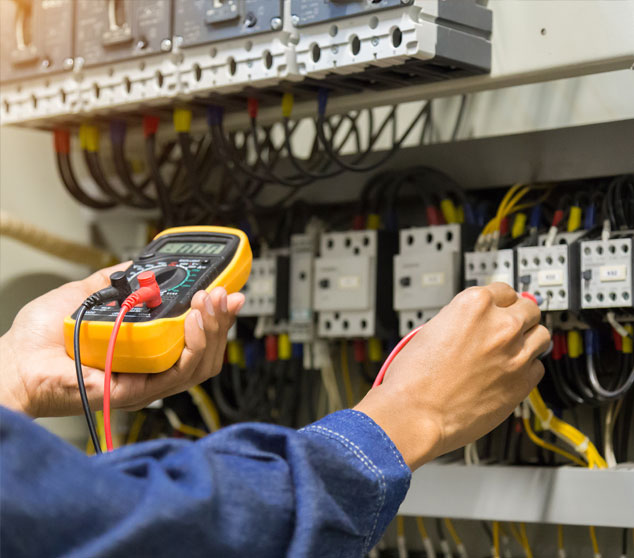
Commercial HVAC systems are key infrastructure elements in modern business facilities. These integrated systems require specialised skill sets, blending technical know-how with real-world implementation experience within commercial frameworks. To do so, commercial electricians must develop sustainable solutions that meet immediate operational needs and ensure long-term reliability while complying with industry standards and regulations.
Design and maintenance of systems in modern commercial facilities demand profound approaches. Universal contractors know how the various building systems relate to each other while paying attention to performance requirements and energy performance. Knowledge of these factors can aid in maintaining system dependability by selecting appropriate design and maintenance methods.
Commercial Electricians Plant Services
Professional Requirements
Commercial electricians ensure that HVAC systems and other business functions go off without a hitch. Professionals who have both extensive technical training and experience in commercial environments. They have a wealth of knowledge and expertise that covers everything from simple new installations to ongoing maintenance of existing systems to ensure they conform to modern commercial electricians’ regulations and safety standards.
You should have picked up the essential knowledge and comprehension of commercial power prerequisites and the distribution system through your professional electrical work experience. These professionals also ensure that electrical services are adequately sized and protected. This experience improves operational reliability while supporting safety and efficiency across commercial facilities powering the buildings.
System Integration
Modern commercial buildings need high-tech electrical work to reproduce and integrate complex systems. Professional commercial electricians know the requirements for coordinating different commercial air conditioning equipment, lighting, and general power distribution systems within architectural and electrical systems. Expertise in integration like this also helps provide reliable operation with the proper safety considerations over interconnected systems.
A control system implementation is critical to commercial electricians work. Building management systems that coordinate various facility operations are installed and configured correctly by professional electricians. It’s part of keeping adequate oversight capabilities while instituting appropriate safety precautions across integrated systems.
Commercial HVAC Solutions
System Design Considerations
HVAC systems designed and installed by professionals integrate to operate efficiently while meeting the facility’s individual needs. Careful evaluation of cooling and heating loads, airflow requirements, and zone control needs are all part of this process. Experienced contractors know how to size systems correctly but can still provide redundancy for mission-critical applications.
Many design considerations include immediate operational needs versus potential future growth needs. Professional contractors assist in assessing each system’s options and considering factors such as energy efficiency, maintenance costs, and years of reliable service. This holistic process ensures the right systems are selected and continue to be relevant in the practical operational environment.
Installation Requirements
Installation quality practices have a significant impact on system performance and long-term reliability. Professional contractors consolidate their focus on the placement of proper equipment, ductwork design, and control system integration. Attention to installation detail also helps ensure the system performs at its peak and that access for maintenance is safe and commensurate with the manufacturer’s recommendations.
Quality of installation means more than just correctly mounting the equipment; it means accurately charging the system, balancing airflow, calibrating the control system, and so on. Professional installers perform complete system tests to confirm everything works correctly with proper documentation describing what was installed. This comprehensive approach goes a long way in avoiding operational challenges going forward while delivering system effectiveness.
Maintenance and Service Programs
Preventive Maintenance
Routine system maintenance has critical functions for both reliability and efficiency. Professional service programs include full inspection schedules, component testing, and preventive maintenance procedures. These programs assist in detecting problems before they disrupt system operations while ensuring optimum performance levels.
They often involve cleaning major components, confirmation of control systems, and in-depth performance testing. Usually, regular service can prevent unexpected failures and standards while following the appropriate standards. This preventative action protects significant equipment investments and promotes consistent uptime.
Emergency Response Capabilities
HVAC services and commercial electricians have adequate resources and skills to deal with emergencies properly. This includes access to essential replacement parts and qualified technicians who can respond quickly.
Emergency service capabilities often include temporary solutions that maintain essential operations during system repairs. Knowing what emergency services are available allows your business to prepare for current and potential system malfunctions while ensuring the proper response when such issues arise.
Energy Management and Efficiency
Operational Optimisation
Most commercially available systems are already equipped to optimise energy use, while satisfactory performance is guaranteed. Professional services ensure the system operates efficiently with the proper maintenance and control system configuration. This focus on efficiency enables operational costs to be managed while comfort levels and system performance can be upheld.
Maintenance practices are all part of energy management strategies. Expert insights highlight areas where efficiency can be enhanced without compromising necessary performance. This balanced approach allows businesses to manage energy costs while ensuring effective and reliable system operation.
Future Technology Trends
Technologies used by commercial electricians have been developing continuously, adding features that raise performance and efficiency to new heights. Knowing the significant technology trends today helps make choices when selecting systems with the guidance of possible future development. Expertise helps assess new technologies in light of individual application needs.
Integration capabilities are continually expanding by developing more advanced monitoring and control systems. Professional contractors assist with evaluations of these developments while helping to stay focused on practical operational needs. This forward-looking approach helps to ensure systems are up-to-date yet still operate reliably.
Conclusion
Commercial HVAC services and commercial electrical systems require significant consideration for practical input in addition to technical requirements. Selecting the right system to provide the best long-term performance requires knowledge of the different technologies and their advantages. Successful selection, installation, and maintenance are ensured by commercial electricians, and the system operates dependably and effectively.
